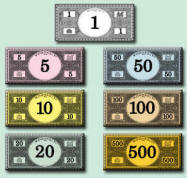The Free Market Center
The Free Market Center
 It seems that a lot of confusion exists about the role of currency (that
Monopoly® money that you fold up and put in your pocket) in the
banking system and the relationship of currency to bank reserves. I will attempt
to clear up some of that confusion.
It seems that a lot of confusion exists about the role of currency (that
Monopoly® money that you fold up and put in your pocket) in the
banking system and the relationship of currency to bank reserves. I will attempt
to clear up some of that confusion.
In the modern American banking system most legal currency consists of notes issued by the Federal Reserve Bank. These notes have an imprint at the top that reads "Federal Reserve Note." Federal Reserve Notes (what we call bills) amount to a promise from the Federal Reserve Bank to pay to you something (right, nothing specific) upon demand.
Take one of these notes to a Federal Reserve Bank branch, knock on the door, and ask them to pay their obligation. After they get through laughing, they will tell you that they don't do business with the public and direct you to your bank.
Ask your bank to redeem your Federal Reserve Note and they will give you one just like it.
In other words, most of the stuff you think of as money, simply amounts to an IOU from an organization that will not talk to you, yet offers to pay you in the form of more IOUs.
Coins have only a slightly different nature. The Treasury Department issues coins, but they do so through the Fed. Coins do create an obligation on the part of the Federal government, but only to pay you more of the same stuff.
In summary, only promises (by the Fed or the Government) back what you associate most with money.
NOTE: Because of the subjective nature of value, this system will work as long as people accept these IOUs as money. So, don't panic—yet.
Although denominated in dollars, bank reserves never circulate in the general market. Only Federal Reserve member banks and the Fed itself can transact business in reserve dollars. When banks transfer money through the Fed for the accounts of their customers, the bank transfers reserve dollars from one bank's reserve account to another bank's reserve account. The receiving bank then issues a credit (an IOU of its own) to the customer receiving the funds.
Currency seems like an exception to this statement, because currency issued by the Federal Reserve Bank will end up in the hands of the public. Although currency in bank vaults counts as bank reserves, that currency ceases to count as reserves when issued to the public. Currency can never act as bank reserves or money (as defined earlier) but not both at the same time. (In the bank vault, it acts as reserves; in your pocket, it acts as money.) It remains consistent, therefore, to say that reserves dollars never circulate in the general economy.
NOTE: In the following tables I have colored reserve dollars blue as a reminder that they do not flow into consumer's hands.
© 2010—2020 The Free Market Center & James B. Berger. All rights reserved.
To contact Jim Berger, e-mail: